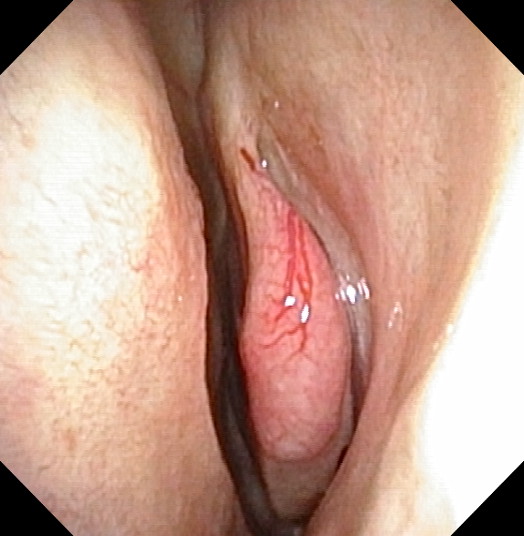Nosebleeds in Children and Adults: Should I be Worried?

Large blood vessel seen inside the left nasal passage of a 40 year old man who suffered from recurrent nosebleeds in Singapore.
Suffering from nosebleeds in Singapore can be quite frightening because you don’t know if they will stop on their own, or how long each episode will last! As an experienced ENT doctor in Singapore, many children and adults with recurrent nosebleeds come to see us at The ENT Clinic because they are worried about why their nose keeps on bleeding. Recurrent nosebleeds can also lead to heavy blood loss and anaemia (low blood count), making some people literally feel faint and light-headed.
For most patients, the nosebleeds usually originate from delicate blood vessels at the front of the nasal septum, the central bone dividing your left and right nasal passages. When they sneeze, sniff, blow or dig their noses, these friable blood vessels easily rupture and bleed. It’s tricky to stop children from picking their noses!
Suffering from hayfever and nasal allergy problems tends to worsen the nosebleeds as it makes the skin in this area rather dry and itchy, so nasal allergy problems should be treated too. Read more about nasal allergy problems at https://www.drannabelle.com/nose-and-sinus-problems-surgeon-children-adults.html
Some patients may have serious underlying conditions which affect the ability of their blood to clot, hence they may suffer from nosebleeds which take much longer to stop on their own. Other patients may be taking regular blood-thinning medications such as aspirin, plavix or warfarin/coumadin for their heart or stroke conditions, therefore nosebleeds can commonly occur with even the slightest trauma.
Recurrent nosebleeds should most definitely be checked out properly with a nasal endoscopy (“nose scope”) to make sure that they aren’t related to a tumour growing inside the nose. Nose cancer or Nasopharyngeal Cancer (NPC) in the 8th most common cancer in Singapore so this should be screened for, especially if you have a relative with NPC like your parent or sibling. There are now some extremely advanced screening blood tests using antibody protein markers which can lay your fears to rest if the results come back negative.
But what can you do to stop nosebleeds at the front of the nose? Here are some of Dr Annabelle’s tips to stop or prevent nosebleeds:
- Protect the delicate skin just inside your nostrils by applying a thin layer of Vaseline as a buffer against dry or cold air. This comes in useful if you are a frequent flier due to the drier atmosphere inside the airplane cabin.
- Try not to blow your nose as this can potentially injure the fragile blood vessels which run close to the skin surface inside your nose. You’ll be surprised at just how much force is generated by blowing your nose!
- Don’t dig or pick your nose because this may lead to a traumatic nosebleed and your fingers may also be a source of infection.
- If your nose does start to bleed, don’t panic! Pinch the soft part of your nose firmly between your thumb and index finger for at least 15 minutes without letting go and try to breathe calmly through your mouth.
- Consider getting those blood vessels at the front of your nose sealed off with the simple, safe and painfree procedure of Silver Nitrate cautery which is usually done in clinic by your top ENT specialist in Singapore. It takes just a few seconds (picture below)!

Share this blog via:
